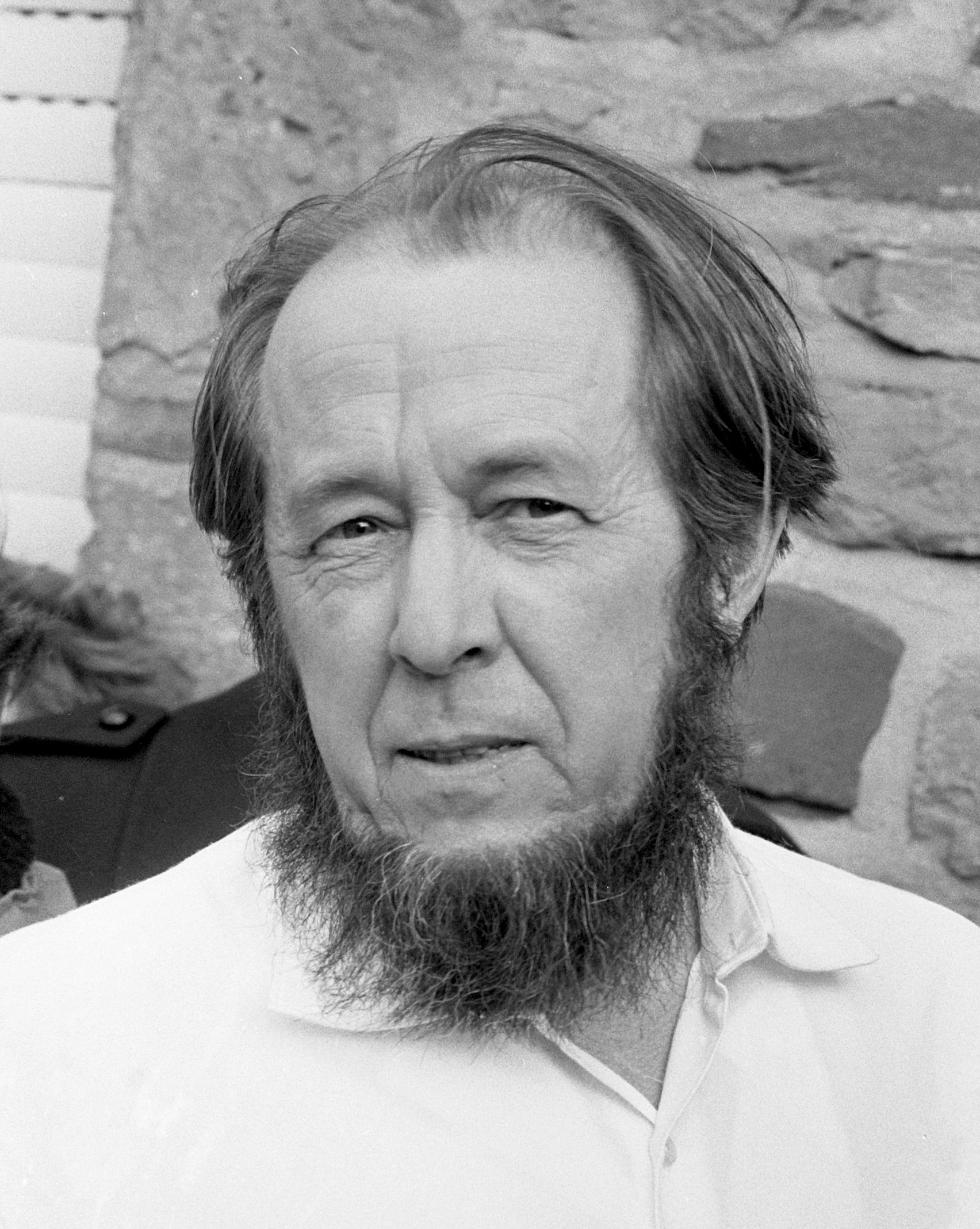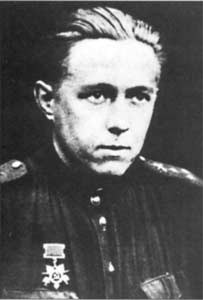Aleksandr (Alexander) Solzhenitsyn, author of One Day in the Life of Ivan Denisovich, was a Russian author, activist, and critic of the socialist Stalin-developed regime. Born to a single mother on December 11, 1918 in Kislovodsk, after his father died shortly before his birth, Solzhenitsyn says "Even as a child, without any prompting from others, I wanted to be a writer, and indeed, I turned out a good deal of the usual juvenilia."


Solzhenitsyn in the army
In a 1945 letter to a school friend Solzhenitsyn made remarks against Stalin and the regime, using code names for them, but the letter was intercepted by authorities and Solzhenitsyn arrested. Under Article 58 (for political crimes), he was sentenced in July 1945 to eight years in detention camps and permanent exile from Russia. He worked for a year in a behavioral correction camp before being transferred to a sharashia, a "special prison" for prisoners with university degrees in sciences and mathematics, where he conducted scientific research. After four years though, he was moved again to Ekibastuz, a labor camp similar to the one in One Day in the Life of Ivan Denisovich. When his sentence ended, he was again exiled to Kazakhstan. There, Solzhenitsyn contracted a cancerous tumor and was near death before he was allowed back in the country for an operation. During his exile he also taught math and physics in a primary school.

Solzhenitsyn as a prisoner at Ekibastuz
Following the death of Stalin and the induction of a more liberal government, Solzhenitsyn approached the magazine Novy Mir with One Day in the Life of Ivan Denisovich. The book was published a year later and became an instant hit both in Russia and overseas for its clear depiction of one of the gulag camps. However, Solzhenitsyn was soon forced into underground publishing and then totally exiled from the Soviet Union due to the reintroduction of a stricter government. After being offered a home at Stanford, he settled in Vermont with his wife and three children. Due to the fall of the Soviet Union in 1989, his citizenship was restored and he settled in Russia until he died on August 3rd, 2008.
Solzhenitsyn's time at Ekibastuz inspired One Day in the Life of Ivan Denisovich. Like Shukov in the book, Solzhenitsyn worked in masonry. The camp in the book is also heavily based off of Ekibastuz, where prisoners worked in sub-zero temperatures and only got a day off if it was below -40 degrees. Post Stalin's death, Nikita Khrushchev came to power with a goal to de-Stalinize Russia. In an effort to repress his processor's ideas, One Day in the Life of Ivan Denisovich was allowed to be published without any government censorship. After Khrushchev's fall, Solzhenitsyn lost publishing privileges and cultural activities became restricted.
Sources:
- Aleksandr Isayevich Solzhenitsyn." Bio. A&E Television Networks, 2014. Web. 10 Dec. 2014.
- "Aleksandr Solzhenitsyn." Newsmakers. Vol. 4. Detroit: Gale, 2009. World History in Context. Web. 10 Dec. 2014.<http://ic.galegroup.com/ic/whic/ReferenceDetailsPage/ReferenceDetailsWindow?failOverType=&query=&prodId=WHIC&windowstate=normal&contentModules=&display-query=&mode=view&displayGroupName=Reference&limiter=&u=meri75411&am p;currPage=&disableHighlighting=false&displayGroups=&sortBy=&source=&search_withi n_results=&p=WHIC%3AUHIC&action=e&catId=&activityType=&scanId=&documentId=GALE%7CK1618004997>
- "Aleksandr Solzhenitsyn Publishes November 1916, January, 1999." Historic World Events. Detroit: Gale, 2004. World History in Context. Web. 10 Dec. 2014. <http://ic.galegroup.com/ic/whic/ReferenceDetailsPage/ReferenceDetailsWindow?failOverType=&query=&prodId=WHIC&windowstate=normal&contentModules=&display-query=&mode=view&displayGroupName=Reference&limiter=&currPage=&d isableHighlighting=false&displayGroups=&sortBy=&search_within_results=&p=WHIC%3AUHIC& amp;action=e&catId=&activityType=&scanId=&documentId=GALE%7CBT2359079908&source=Bookmark&u=meri75411&jsid=02f4a99420ce4d688ac1e3c2db329d2c>
- "Alexandr Solzhenitsyn - Biographical". Nobelprize.org. Nobel Media AB 2014. Web. 10 Dec 2014. <http://www.nobelprize.org/nobel_prizes/literature/laureates/1970/solzhenitsyn-bio.html>
- Kaufman, Michael T. "Solzhenitsyn, Literary Giant Who Defied Soviets, Dies at 89." The New YorkTimes. The New York Times Company, 4 Aug. 2008. Web. 10 Dec. 2014. <http://www.nytimes.com/2008/08/04/books/04solzhenitsyn.html?pagewanted=all&_r=0>.
Interesting presentation It was great to learn about how he was convicted of a "crime" and was sent to a prison, which was the base to his book "One Day in the Life of Ivan Denisovich.
ReplyDeleteThis was really well-done and I learned a lot about Solzenheitsyn. I think he was a truly incredible person who endured and persevered in unthinkable conditions. I mentioned this in my own post, but I think he really is proof that protest can persevere in even the worst of conditions and I am sure that gives hope to many people. I think that it was interesting how being a mathematics and physics student was his "plan B," but it really seemed to help him throughout his life. He was transferred to a special camp to do scientific research instead of hard labor because of his degrees. Also, the mathematics degree in particular helped him create patterns and rhyme so that he could remember his stories when he couldn't write them down in the Gulag. Without those degrees One Day in the Life of Ivan Denisovich may never have been published.
ReplyDeleteThis was a well-written blog. You made Solzenheitsyn's passion obvious to the reader, and also how he was a brilliant man, not only in literature, but also in mathematics and science. Solzenheitsyn's arrest and prosecution seemed extremely unjust. It is outrageous that for one slanderous letter he had to endure over a decade of punishment. To add I am curious as to how the soviets were able to intercept a letter, and how they carried out investigations as to who was speaking badly of Stalin.
ReplyDeleteThis blog was very informative and interesting. It amazed me how smart Solzenheitsyn was and how he used his strong understanding of literature, mathematics and science to persevere through the gulags and all of the challenges they brought. It was really interesting to read that Solzenheitsyn used mathematics and the degree he earned to create patterns to help him remember his stories because if he was caught writing things down in the gulags he would have been killed.
ReplyDeleteThis comment has been removed by the author.
ReplyDeleteIt really surprised me how closely communication was monitored since the communists check things like letters between college friends. It also surprised me that the punishment was so severe for something that seems so innocent. After reading the post I gained an even greater respect for Solzhenitsyn because he suffered through so much and managed to share an extremely painful but important story with the world. He also shared his story despite the fact that it caused him to be fully exiled from his homeland. It was interesting how Khruschev allowed the book to be published to help with his de-stalinization efforts. The article was well written and filled with surprising facts and stories.
ReplyDeleteWithout even knowing, the Day in the Life of Ivan Denisovich was basically primary source. I had no idea that the author was a prisoner in many detention camps himself, and even one as similar to the one that Ivan was in. Aleksandr's story was remarkable and inspiring, more like a hero, that he could overcome so much adversity in his life and he could ultimately come to a happy point in his life. I liked the format of your post because you had smaller sections divided by interesting pictures. The smaller paragraphs were easier to read and comprehend. It's cool to think that Ivan was basically Aleksandr, so it shows that this book is 100% accurate and contains pure information.
ReplyDeleteprof premraj pushpakaran writes -- 2018 marks the 100th birth year of Aleksandr Isayevich Solzhenitsyn!!!
ReplyDelete